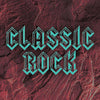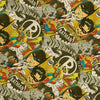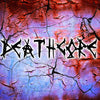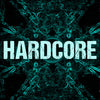Death - Officially Licensed Merchandise
Death, founded by Chuck Schuldiner in 1983, is considered one of the most influential death metal bands and pioneers of the genre. Known for their technical skill, philosophical lyrics, and innovative approach, Death’s music expanded beyond traditional death metal to....
Show More
incorporate elements of progressive metal and complex structures. Albums like Leprosy and Symbolic became landmarks in extreme metal, with Schuldiner’s guitar work and lyrics pushing the boundaries of the genre. His contributions to metal, both as a musician and a visionary, have made Death a foundational influence in extreme metal, shaping its evolution and inspiring generations of musicians.
2. Leprosy (1988) - Known for songs like “Pull the Plug” and “Leprosy,” this album refined their sound and solidified their role as death metal pioneers.
3. Human (1991) - With tracks like “Flattening of Emotions” and “Suicide Machine,” this album incorporated progressive elements, showcasing Chuck 3. Schuldiner’s evolving style.
4. Symbolic (1995) - Featuring songs like “Crystal Mountain” and “Zero Tolerance,” this album is known for its technical complexity and philosophical themes, becoming a classic in extreme metal.
5. The Sound of Perseverance (1998) - Known for tracks like “Spirit Crusher” and “Flesh and the Power It Holds,” this album is celebrated for its intricate musicianship and introspective lyrics, marking the pinnacle of Schuldiner’s career.
Rick Rozz (Guitar): Known for his raw, heavy guitar style, Rozz played on Death’s early albums, contributing to their brutal sound. His work on Scream Bloody Gore and Leprosy helped establish the foundation of death metal.
Terry Butler (Bass): Butler’s bass playing added depth to Death’s early sound, particularly on Leprosy, and his contributions helped to anchor the band’s aggressive, technical style.
Gene Hoglan (Drums): Known as “The Atomic Clock” for his precision, Hoglan joined Death on Individual Thought Patterns, adding a technical, intricate drumming style that elevated the band’s progressive elements.
Steve Di Giorgio (Bass): Di Giorgio’s fretless bass work on albums like Human and Individual Thought Patterns brought a new level of technical skill and innovation to Death, expanding the boundaries of what death metal could achieve.
Death
2. Leprosy (1988) - Known for songs like “Pull the Plug” and “Leprosy,” this album refined their sound and solidified their role as death metal pioneers.
3. Human (1991) - With tracks like “Flattening of Emotions” and “Suicide Machine,” this album incorporated progressive elements, showcasing Chuck 3. Schuldiner’s evolving style.
4. Symbolic (1995) - Featuring songs like “Crystal Mountain” and “Zero Tolerance,” this album is known for its technical complexity and philosophical themes, becoming a classic in extreme metal.
5. The Sound of Perseverance (1998) - Known for tracks like “Spirit Crusher” and “Flesh and the Power It Holds,” this album is celebrated for its intricate musicianship and introspective lyrics, marking the pinnacle of Schuldiner’s career.
Rick Rozz (Guitar): Known for his raw, heavy guitar style, Rozz played on Death’s early albums, contributing to their brutal sound. His work on Scream Bloody Gore and Leprosy helped establish the foundation of death metal.
Terry Butler (Bass): Butler’s bass playing added depth to Death’s early sound, particularly on Leprosy, and his contributions helped to anchor the band’s aggressive, technical style.
Gene Hoglan (Drums): Known as “The Atomic Clock” for his precision, Hoglan joined Death on Individual Thought Patterns, adding a technical, intricate drumming style that elevated the band’s progressive elements.
Steve Di Giorgio (Bass): Di Giorgio’s fretless bass work on albums like Human and Individual Thought Patterns brought a new level of technical skill and innovation to Death, expanding the boundaries of what death metal could achieve.
Oops! there are no products in this collection.
But check out our top trending products.
FEATURED GENRES
Death, founded by Chuck Schuldiner in 1983, is considered one of the most influential death metal bands and pioneers of the genre. Known for their technical skill, philosophical lyrics, and innovative approach, Death’s music expanded beyond traditional death metal to....
Show More
incorporate elements of progressive metal and complex structures. Albums like Leprosy and Symbolic became landmarks in extreme metal, with Schuldiner’s guitar work and lyrics pushing the boundaries of the genre. His contributions to metal, both as a musician and a visionary, have made Death a foundational influence in extreme metal, shaping its evolution and inspiring generations of musicians.
2. Leprosy (1988) - Known for songs like “Pull the Plug” and “Leprosy,” this album refined their sound and solidified their role as death metal pioneers.
3. Human (1991) - With tracks like “Flattening of Emotions” and “Suicide Machine,” this album incorporated progressive elements, showcasing Chuck 3. Schuldiner’s evolving style.
4. Symbolic (1995) - Featuring songs like “Crystal Mountain” and “Zero Tolerance,” this album is known for its technical complexity and philosophical themes, becoming a classic in extreme metal.
5. The Sound of Perseverance (1998) - Known for tracks like “Spirit Crusher” and “Flesh and the Power It Holds,” this album is celebrated for its intricate musicianship and introspective lyrics, marking the pinnacle of Schuldiner’s career.
Rick Rozz (Guitar): Known for his raw, heavy guitar style, Rozz played on Death’s early albums, contributing to their brutal sound. His work on Scream Bloody Gore and Leprosy helped establish the foundation of death metal.
Terry Butler (Bass): Butler’s bass playing added depth to Death’s early sound, particularly on Leprosy, and his contributions helped to anchor the band’s aggressive, technical style.
Gene Hoglan (Drums): Known as “The Atomic Clock” for his precision, Hoglan joined Death on Individual Thought Patterns, adding a technical, intricate drumming style that elevated the band’s progressive elements.
Steve Di Giorgio (Bass): Di Giorgio’s fretless bass work on albums like Human and Individual Thought Patterns brought a new level of technical skill and innovation to Death, expanding the boundaries of what death metal could achieve.






































